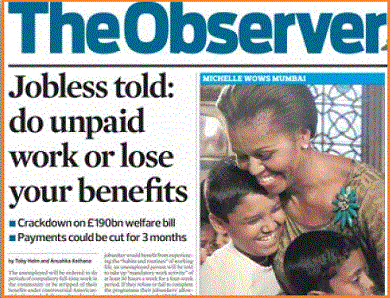What does EdM do about the “jobless must work” plan?

Is the IDS programme the next “wedge issue”?
The big political news this morning is the Observer’s front page splash saying that under plans to be announced in the next few days the jobless could risk losing their benefits if they don’t do unpaid manual work.
This is based on the belief that jobseekers “would benefit from experiencing the habits and routines of working life”. According to the paper the unemployed will be told to take up “mandatory work activity” of at least 30 hours a week for a four-week period. The sanction for those who refuse could be a withdrawal of benefit.
What we’ve seen so far with the coalition is that what might be harsh proposals are encapsulated with a central idea that has broad public appeal. Thus the housing benefit changes are presented with the big focus on the cap to stop more than £20,000 a year being paid to a claimant.
My guess is that compulsory voluntary work for job-seekers will also strike a chord and poll very well.
Politically this could be dangerous for Labour because the last thing they want to be portrayed as is the party that supports the “work-shy” – however unfair that tag might be.
For it’s becoming increasingly clear that a key component of the next general election campaign will be welfare with the coalition seeking to isolate the red team. This is how Labour blogger and former party staffer, Hopi Sein, described earlier measures:-
“The Housing benefit cap and removing Child benefit for top rate tax payers are classic wedge issues. Most people support the seemingly fair principle behind them, and that principle is used to disguise a set of policies that many voters would not support.
Oppose the wedge policy, and Cameron and co accuse you of supporting the policy the public are against. It’s a trap..”
Will the plan for the jobless be presented in the same way? Almost certainly and that’s EdM’s problem.